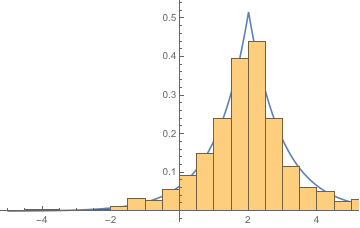Context
I would like to find the MaximumLikelihood solution
of a customized PDF
Let's start with a built in PDF. Following the documentation
dat = RandomVariate[LaplaceDistribution[2, 1], 1000];
param=FindDistributionParameters[dat, LaplaceDistribution[μ, σ],
ParameterEstimator -> {"MaximumLikelihood", Method -> "NMaximize"}]
(* {μ->2.27258,σ->0.521354} *)
Show[Plot[
PDF[LaplaceDistribution[μ, σ] /. param, x], {x, -5, 5}],
Histogram[dat, Automatic, "PDF"]]

works as expected. It finds a good estimator of $\mu$ and $\sigma$.
The problem
Now let me do the same with a customized PDF. Here I just impose that my custom PDF cannot be evaluated before it is given numerical values.
Clear[myLaplaceDistribution];
myLaplaceDistribution[μ_?NumberQ, σ_?NumberQ] :=
LaplaceDistribution[μ, σ]
Then
dat = RandomVariate[LaplaceDistribution[2, 1], 10];
FindDistributionParameters[dat, myLaplaceDistribution[μ, σ],
ParameterEstimator -> {"MaximumLikelihood", Method -> "NMaximize"}]
does not return a maximum likelihood estimate.
I am using 10.3.0 for Mac OS X x86 (64-bit) (October 9, 2015)
Question:
Any suggestions on how to make
FindDistributionParameterswork with unevaluated PDFs?
PS: I am aware of this https://mathematica.stackexchange.com/a/107914/1089 but here this question is a bit more general than simply a transformed distribution? And I have tried
dat = RandomVariate[LaplaceDistribution[2, 1], 10];
FindDistributionParameters[dat,
myLaplaceDistribution[μ, σ], {{μ,
Mean[dat]}, {σ, Mean[dat]}},
ParameterEstimator -> {"MaximumLikelihood", Method -> "NMaximize"}]
it does not seems to help.
Update
This related answer https://mathematica.stackexchange.com/a/61426/1089 does not seem to help.
If I define explicitly the domain for the PDF
Clear[myLaplaceDistribution2];
myLaplaceDistribution2[μ_?NumberQ, σ_?NumberQ] :=
ProbabilityDistribution[
PDF[LaplaceDistribution[μ, σ], x], {x, -Infinity,
Infinity}, Assumptions -> (μ ∈ Reals && σ > 0)]
It still fails
dat = RandomVariate[LaplaceDistribution[2, 1], 10];
FindDistributionParameters[dat,
myLaplaceDistribution2[μ, σ], {{μ,
Mean[dat]}, {σ, Mean[dat]}},
ParameterEstimator -> {"MaximumLikelihood", Method -> "NMaximize"}]
As @J.M. points out one can use the fact that Mathematica can cope with the fact the PDF need not be normalized. As follows
Clear[myLaplaceDistribution3];
myLaplaceDistribution3[μ_, σ_] =
ProbabilityDistribution[
2 PDF[LaplaceDistribution[μ, σ],
x], {x, -∞, ∞},
Assumptions -> (μ ∈ Reals && σ > 0),
Method -> "Normalize"]
(Note the factor of 2 in front of PDF to make the PDF not normalized.)
Then
dat = RandomVariate[LaplaceDistribution[2, 1], 10];
FindDistributionParameters[dat, myLaplaceDistribution3[μ, σ],
ParameterEstimator -> {"MaximumLikelihood"}]
works.
I still think there must be situations where the PDF cannot be known before its arguments are known, and where Maximum likelihood analysis would make sense?
Note that I can always make my own:
MyFindDistributionParameters[data_, distrib_, var_] :=
NMaximize[{Total[Log@ PDF[distrib, #] & /@ data],
DistributionParameterAssumptions[distrib]}, var][[2]];
MyFindDistributionParameters[dat,LaplaceDistribution[μ, σ], {μ, σ}]
but I was hoping Mathematica would provide me with a more efficient algorithm? (this seems to be 10 times slower than the built in function).

ProbabilityDistribution[]instead to express your custom distribution? $\endgroup$ProbabilityDistribution[]supports the settingMethod -> "Normalize"so that the normalization is done on your behalf. $\endgroup$FindDistributionParameterswithout giving them numbers is essential. What is it about having your second example work when removing?NumberQdoesn't work for you? (I'm not trying to be sarcastic. I'm just clearly missing something.) $\endgroup$